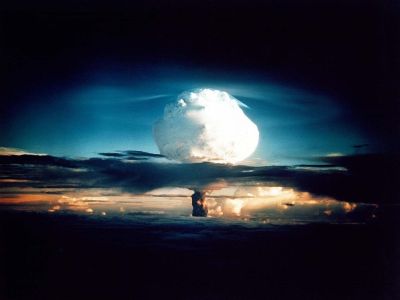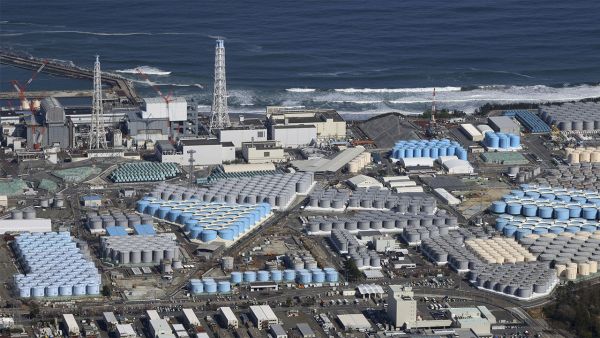Physical Scientists, the Union of Concerned Scientists, and Pugwash

Formed after WWII, the Union of Concerned Scientists, Pugwash, and affiliated student groups provide a voice for scientists who are concerned with the social responsibility of their own work, the work of other scientists, and governmental use of science. A part of the Research, Ethics, and Society project, this case can be used to address the social responsibilities of researchers, particularly those concerning public education and political advocacy.
- Should academic scientists speak publicly on policy issues related to their research? Why or why not?
- How can organizations like Union of Concerned Scientists contribute to policy debates?
Nuclear Power Plant Accident
Ministry of Land, Infrastructure, Transport and Tourism".
On March 11, 2011, a powerful earthquake, centered eighty miles from the northeastern coast of Japan, shook the island nation. Shortly after the earthquake, an enormous tsunami hit the northern coastline. Six nuclear reactors at the Fukushima Dai-Ichi power plant lay in the path. The initial earthquake lasted five minutes, an almost unheard of length of time. The strong earthquake and subsequent tsunami set Japan on a path of nuclear crisis.
The Fukushima power plant lost electricity and soon after, its emergency batteries died. With a loss of electricity, the reactor core cooling systems shut down, temperatures rose, pressure built, and hydrogen gas exploded in some of the reactor buildings. As the ongoing nuclear crisis unfolded in Japan, the American media and government called on American nuclear experts for their opinions and insights about the catastrophe.
What Roles Should Scientists Play in Public Education and Politics?
Members of the Union of Concerned Scientists (UCS) became "go to" experts to explain the nuclear problems and provide updates about the situation in Japan for U.S. media and government. UCS scientists held daily telephone media briefings on the Japan nuclear power crisis. On March 16, 2011, Edwin Layman testified before the U.S. Senate, on behalf of UCS, to explain the organization's views on the nuclear crisis in Japan and its implications for nuclear power in the U.S. [1]
This was not the first time, though, that the UCS provided expertise during a nuclear crisis. Two months before the 1979 Three Mile Island nuclear power plant accident, UCS called for the government to shut down the facility because the organization's nuclear power experts felt that the Nuclear Regulatory Commission had dramatically understated the probability of an accident. After the partial core meltdown, state and federal officials turned to UCS scientists for expert advice about the Three Mile Island accident and the risks to neighboring communities.
UCS's objectives
The UCS has long called attention to nuclear power and weapons. In 1968, 50 senior faculty members at the Massachusetts Institute of Technology (MIT) wrote and signed a call for action against military weapons and leadership toward a more responsible exploitation of scientific knowledge by universities and government-sponsored agencies. Currently, the UCS advocates scientific research applied to environmental and social problems broadly. [2] For example, the organization
- Calls for signing of the Kyoto Protocol to reduce climate change
- Advocates for a food system that combines innovation with sustainability
- Works with citizens to produce high-in-nutrition, safe, and low-cost foods
- Brings attention to the role of, and need for, scientific integrity in federal policy-making
- Influences public policy-making by helping draft legislation, preparing analysis papers and technical assessments, and communicating with the public through news and other media venues
Pugwash
In 1955, notable physical scientists, including Albert Einstein and Max Born, issued a manifesto urging scientists to think about their responsibility to the public in an era of nuclear weapons. Building off the momentum of the manifesto, scientists held the first Pugwash Conference in 1957 at Pugwash, Nova Scotia. They gathered to address nuclear issues and the social responsibility of scientists. In 1995, physicist Joseph Rotblat (co-founder of Pugwash) and Pugwash were co-recipients of the Nobel Peace Prize in recognition of their efforts to diminish the role of nuclear weapons in international politics.
Student Pugwash USA and International Student/Young Pugwash
Student Pugwash USA and International Student/Young Pugwash are student organizations affiliated with Pugwash. Similar to student chapters of Engineers Without Borders, they provide a forum for beginning scientists and engineers to exercise social responsibility. Their goals are to help individuals establish a voice and understand social responsibilities in science and technology.
Their social responsibility concerns are broad and include:
- Climate change
- Nuclear, chemical and biological weapons
- Scientific responsibility
- Environmental degradation
- Science and international cooperation
Scientists' Social Responsibilities, Nuclear Power, and Weapons: Questions to Consider
- UCS and Pugwash advocate thinking about the long-term outcomes of scientific activities. What possible contributions to public interests do they imagine science might make?
- What are some social responsibility areas that both the UCS and Pugwash agree upon?
- Imagine a reporter wants to interview a graduate student about an incident related to her field of study. Should she agree? Why or why not? What might she hope to achieve through speaking with the reporter?
References & Additional Resources
1. Union of Concerned Scientists. (2011, May 3). Nuclear crisis in Japan.
2. Forge, J. (2008). The responsible scientist. Pittsburgh: University of Pittsburgh Press.
This case is based upon work supported by the National Science Foundation under Grant No. 1033111. Any opinions, findings, and conclusions or recommendations expressed in this material are those of the author(s) and do not necessarily reflect the views of the National Science Foundation.
Our project team and advisory board read many drafts and provided important insights. Project team: Heather Canary, Joseph Herkert, Jameson Wetmore, Ira Bennett, and Jason Borenstein. Advisory board: Joan Brett, Jim Svara, Richard Fish, Juergen Gadau, Shelli McAlpine, Timothy Newman, Byron Newberry, Patrick Phelan, and Petra Schroeder.


